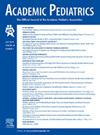The Impact of Telelactation on Breastfeeding Satisfaction at 6 Months Postpartum: Evidence From a Randomized Controlled Trial
IF 2.8
3区 医学
Q1 PEDIATRICS
引用次数: 0
Abstract
Objective
This study evaluates the impact of telelactation (video breastfeeding support visits) on breastfeeding satisfaction and the likelihood of breastfeeding another child. Breastfeeding satisfaction is a key person-centered outcome and indicator of breastfeeding success and is associated with a longer duration of breastfeeding.
Methods
This randomized controlled trial randomized pregnant individuals to receive a telelactation app (intervention group) or an infant care e-book (control group). The main outcome measured was self-reported breastfeeding satisfaction at 24 weeks postpartum, while a secondary outcome assessed the likelihood of breastfeeding another child. We estimated unadjusted and adjusted linear regression models for the effect of telelactation on breastfeeding satisfaction and logistic regression models for the effect of telelactation on the likelihood of breastfeeding another child. We also examined whether the effects of telelactation differed by breastfeeding problems experienced.
Results
Results indicated that telelactation significantly improved breastfeeding satisfaction scores by 0.53 points (confidence interval (CI): [0.04,1.04], P = 0.04) and increased the likelihood of participants being very likely to breastfeed another child by 7% (risk ratio = 1.07 [CI: {1.01, 1.14}, P = 0.02]; adjusted risk ratio = 1.07 [CI: {1.01, 1.14}, P = 0.03]). We found no significant differences in outcomes based on race or ethnicity. Further analysis highlighted that telelactation was particularly beneficial for participants experiencing common newborn/premature feeding issues.
Conclusions
Telelactation can enhance breastfeeding experiences and satisfaction, with implications for public health strategies targeting new parents.
早产对产后6个月母乳喂养满意度的影响:来自一项随机对照试验的证据。
目的:本研究评估远程哺乳(视频母乳喂养支持访问)对母乳喂养满意度和母乳喂养另一个孩子的可能性的影响。母乳喂养满意度是一个关键的以人为本的结果和母乳喂养成功的指标,与母乳喂养持续时间较长有关。方法:本随机对照试验将孕妇随机分为两组,一组使用远程催乳app(干预组),另一组使用婴儿护理电子书(对照组)。测量的主要结果是产后24周自我报告的母乳喂养满意度,而次要结果是评估母乳喂养另一个孩子的可能性。我们估计了未调整和调整的线性回归模型对母乳喂养满意度的影响,以及远程哺乳对母乳喂养另一个孩子的可能性的影响的逻辑回归模型。我们还研究了母乳喂养问题对泌乳的影响是否不同。结果:结果表明,远程哺乳显著提高了母乳喂养满意度得分0.53分(CI:[0.04,1.04],p=0.04),使参与者非常可能母乳喂养另一个孩子的可能性增加了7% (RR= 1.07 (CI:[1.01, 1.14], p=0.02;ARR = 1.07 (CI: [1.01, 1.14], p=0.03)。我们没有发现基于种族或民族的结果有显著差异。进一步的分析强调,远程哺乳对经历常见新生儿/早产儿喂养问题的参与者特别有益。结论:远程哺乳可以提高母乳喂养的体验和满意度,对针对新父母的公共卫生策略具有启示意义。
本文章由计算机程序翻译,如有差异,请以英文原文为准。
求助全文
约1分钟内获得全文
求助全文
来源期刊

Academic Pediatrics
PEDIATRICS-
CiteScore
4.60
自引率
12.90%
发文量
300
审稿时长
60 days
期刊介绍:
Academic Pediatrics, the official journal of the Academic Pediatric Association, is a peer-reviewed publication whose purpose is to strengthen the research and educational base of academic general pediatrics. The journal provides leadership in pediatric education, research, patient care and advocacy. Content areas include pediatric education, emergency medicine, injury, abuse, behavioral pediatrics, holistic medicine, child health services and health policy,and the environment. The journal provides an active forum for the presentation of pediatric educational research in diverse settings, involving medical students, residents, fellows, and practicing professionals. The journal also emphasizes important research relating to the quality of child health care, health care policy, and the organization of child health services. It also includes systematic reviews of primary care interventions and important methodologic papers to aid research in child health and education.
 求助内容:
求助内容: 应助结果提醒方式:
应助结果提醒方式:


